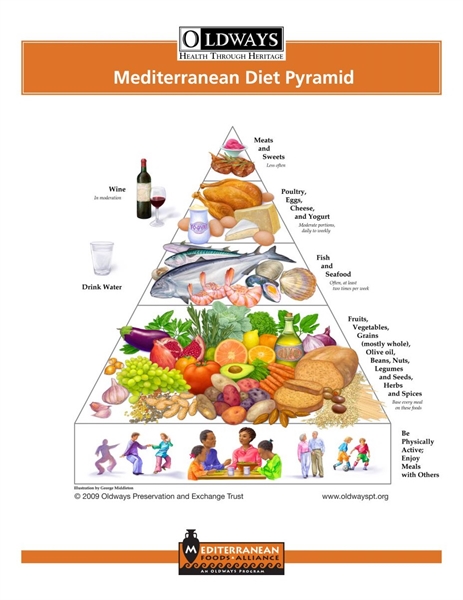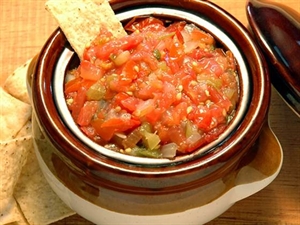International Mediterranean Diet Month on May, 2024: Common Spanish cuisine?
May, 2024 is International Mediterranean Diet Month 2024. Mediterranean Menu Plan Highly rated expert Mediterranean menu plan. Only $10 + free ship.

Travel around Spain and you'll find that you can eat a different kind of dish in almost any town or village. Regional specialties abound, and every region, town or village is proud of its own foods - and will tell you that they're the best in the whole of the country.
On the coast, logically, you'll find some excellent fish and seafood dishes, and inland you'll be delighted with the wonderful dishes made from meat and vegetables. There are an infinite variety of ways of combining these ingredients - and you'll find excellent fresh fruit, too.
Of course all of Spain is famous for the wide variety of appetizers or tapas that are provided as either part of a main meal or as small tidbits to have with drinks.
Outside the main cities you'll not find many smart restaurants, but the food served in the tascas or bars will be tasty and based on fresh local produce. In places like Madrid, Barcelona and other larger cities, you'll find restaurants of all types - and prices - where you'll be able to try not only local specialties, but also international cuisine to the highest standard.
Another very common distinction that can be made in Spain is between summer and winter foods. In summer it is very common to eat cold soups - gazpacho is probably the best known version. It's a kind of cold tomato soup, usually eaten with green pepper, cucumber and small pieces of bread. Winter brings stews and other cooked dishes, such as a cocido. This is a whole meal - it's a kind of stew where you first eat the broth, with noodles, followed by the vegetables, then the meat.
There is a lot of talk about the healthy qualities of the Mediterranean diet, and the traditional Spanish diet fits in well with this. The basic ingredient is olive oil, preferably Extra Virgin Olive Oil. The Mediterranean diet is also rich in cereals, vegetables and fruit. Spanish cooking is also very strong on fish dishes, and Spain has one of the biggest fishing fleets in the world. Strangely enough, in Madrid, which is in the geographic center of the country, over 300 kilometers from the nearest coast, you can find some of the most wonderful fish dishes you'll ever taste.
Vegetables and fruit make up a very important part of many Spaniards' diets. A typical entree will be a salad or a vegetable sauted with ham, and fruit is eaten by many people as a dessert. The main course could be meat or fish.
Desserts in Spain may include the traditional Christmas dish of Turron, a sweet dessert made with almonds and honey. The simple yet elegant flan with its caramelized top and rich custard bottom is an ideal dish to have with a cup of coffee after a wonderful Spanish meal.
Terry Roberts has lived in Spain for over 30 years. Visit his website, ) Travel to Spain, for information and advice for your next trip there - and don't miss his recommendations on the ) Top Ten Things to Do in Spain.

Does what you eat influence your mood?
How Food Affects Your Moods
There's more and more research indicating that, in some ways, diet may
influence mood. Basically the science of food's affect on mood is
based on this: Dietary changes can bring about changes in our brain
structure (chemically and physiologically), which can lead to altered
behaviour.
You should change your diet if you want to try to improve your mood,
read the suggestions below.
1. Don't Banish Carbs -- Just Choose 'Smart' Ones.
The connection between carbohydrates and mood is all about tryptophan,
a nonessential amino acid. As more tryptophan enters the brain, more
serotonin is synthesized in the brain, and mood tends to improve. But
it's important to make smart carbohydrate choices like whole grains,
fruits, vegetables, and legumes, which also contribute important
nutrients and fiber. When you follow a very low carbohydrate diet, it
enhances fatigue and reduces the desire to exercise in overweight
adults after just two weeks.
2. Get More Omega-3 Fatty Acids.
In recent years, researchers have noted that omega-3 polyunsaturated
fatty acids (found in fatty fish, flaxseed, and walnuts) may help
protect against depression. Shoot for two to three servings of fish
per week.
3. Eat a Balanced Breakfast.
Eating breakfast regularly leads to improved mood, according to some
researchers -- along with better memory, more energy throughout the
day, and feelings of calmness. It stands to reason that skipping
breakfast would do the opposite, leading to fatigue and anxiety. And
what makes up a good breakfast? Lots of fiber and nutrients, some lean
protein, good fats, and whole-grain carbohydrates.
4. Keep Exercising and Lose Weight (Slowly).
Some researchers advise that, in overweight people, slow weight loss
can improve mood. Fad dieting isn't the answer, because cutting too
far back on calories and carbohydrates can lead to irritability. And
if you're following a low-fat diet, be sure to include plenty of foods
rich in omega-3s (like fish, ground flaxseed, higher omega-3 eggs,
walnuts, and canola oil.)
5. Move to a Mediterranean Diet.
The Mediterranean diet is a balanced, healthy eating pattern that
includes plenty of fruits, nuts, vegetables, cereals, legumes, and
fish -- all of which are important sources of nutrients linked to
preventing depression.
6. Get Enough Vitamin D.
Vitamin D increases levels of serotonin in the brain. Try to get about
600 international units (IU) of vitamin D a day from food if possible.
7. Select Selenium-Rich Foods.
Selenium supplementation of 200 micrograms a day for seven weeks
improved mild and moderate depression in 16 elderly participants,
according to a small study from Texas Tech University. Previous
studies have also reported an association between low selenium intakes
and poorer moods.
Foods rich in selenium are foods we should be eating anyway such as:
seafood (oysters, clams, sardines, crab, saltwater fish and freshwater
fish), nuts and seeds (particularly Brazil nuts), lean meat (lean pork
and beef, skinless chicken and turkey), whole grains (whole-grain
pasta, brown rice, oatmeal, etc.), beans/legumes Low-fat dairy
products.
8. Don't Overdo Caffeine.
In people with sensitivity, caffeine may exacerbate depression. Those
at risk could try limiting or eliminating caffeine for a month or so
to see if it improves mood.
9. In addition, simply knowing you are taking care of yourself can boost
your mood. And we're all familiar with the power of comfort foods. For
example, drinking a glass of milk before bedtime can trigger a
comforting memory of your childhood.

How Popular Are Peanuts In Mallorca? In Restaurants Specifically?
Japanese or Spanish/Mediterranean? Other places may be possible; TALK TO EACH BEFORE VISITING. In the U.S., I've found that most restaurants are very accommodating and willing to talk before visits. We don't go to Five Guys Burgers and Fries anymore.
SAKANA SUSHI & RESTAURANT Avenida de la Playa 4, Local 2, Palmanova 07181
Contact person Besiki / Olga Telephone +34 971 681 005
Cuisine • Japanese
Description : This recently opened Japanese restaurant features authentic sushi, sashimi and other Japanese food styles served within a chic and informal minimalist decor. Whilst providing remarkable value for money, the enthusiastic and welcoming couple who run the restaurant insist on using only the highest quality and freshest fish and other produce. Service is very friendly and if you still have any room left, you might want to try the delicious cheese cake (non-Japanese of course!!). Take away service is also available.
Directions : From the motorway towards Andratx, take the Palmanova exit. Follow the road towards the Playa (the beach). Sakana is on the left before reaching the Playa de Palmanova
Average Price : Euros20.00 including wine plus tax.
Specialty : Sushi and Sashimi
Special Diets Catered For
• Gluten Free (No Barley Oats, Wheat, Rye)
• Nut Free
• Dairy Free
• Vegetarian
Port Alt C/ Oratorio, 1 · Portals Nous · Calviá · Mallorca · Balearics · Spain
Contact person Kim Brandis
Telephone 971 676 179 / 971 677 254 Fax 971 676 179
Cuisine
• International
• Mallorcan
• Mediterranean
• Spanish
• Vegetarian
Description
Located overlooking the bay of Palma with fantastic sea views and a sun terrace surrounded by bougainvillea. A tranquil, chill out environment with a friendly atmosphere. The dining room is cozy and colourful. Caribbean style bar on the upper terrace, serving drinks and a light tapas menu.
Also in the bar you can ask for salads and pambolis.
Directions
from the centre of Portals Nous village, take calle Oratorio, driving towards the sea, and we are situated next to an historic church, Parroquia de Señora de Portals.
Average Price
Lunch 15€ (menu) Dinner 30€ - 50€ (al la carte)
Specialty
Fresh fish, Ostrich fillet, daily specials, no preservatives, colourants or additives used, menu of the day and evening menu, childrens menu; last week of every winter month-cuisine from another country.
Special Diets Catered For
• Gluten Free (No Barley Oats, Wheat, Rye)
• Nut Free
• Dairy Free
• Colour Additives Free
• Vegetarian
• Vegan











